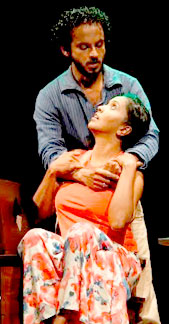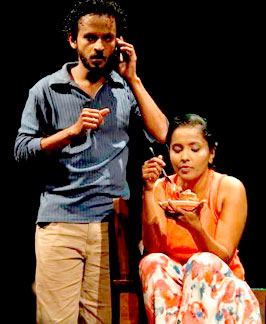|
[DRAMA Review ]
What a Nice Couple:
Between facades and mirages
by Dilshan Boange
Young playwright and director Chamara Guruge presented 'What a Nice
Couple', a two-character One-Act play, at the Tower Hall in mid March.
The play is an unfolding of a scenario of marital turbulence between a
young married couple as enjoy an evening at home to mark their first
wedding anniversary.
 Why
does a play that is basically Sinhala medium have an English title one
might ask? It is I feel a symbolic reflection of how contemporary Sri
Lanka is increasingly becoming a code-mixing people; the mixing being
notably the inclusion of English words and phrases into Sinhala
sentencing. Why
does a play that is basically Sinhala medium have an English title one
might ask? It is I feel a symbolic reflection of how contemporary Sri
Lanka is increasingly becoming a code-mixing people; the mixing being
notably the inclusion of English words and phrases into Sinhala
sentencing.
Conceptions and preconceptions
The title works with a duality in reflecting the situation of the
couple as well. On the one hand it can be thought of as a sardonic
statement about what superficial filament holds the conceptions and
preconceptions of the husband and wife of how they view each other in
respect of what they should be as 'spousal functionaries' in a marriage
smugly declared to be not another typical marriage mired in the
hypocritical market economy driven rat race. On the other hand it can be
a statement that empathises with how caring they turn out to be to each
other towards the end in being committed to forge ahead and not abandon
each other despite being shattered in their self conceptions of what
makes their marriage a remarkable one.
The performance had its immensely compelling moments, proving the
calibre of acting talent coupled with the effectiveness of the script
could keep an audience magnetised to the story unfolding on stage,
although it comes off as something of a slow moving scenario that dwells
on the realness of silences and the quietude of a relaxing evening
between two married people may have when there is no 'social dimension'
involved.
In this regard, the actor Nilanka Dahanayaka and the actress Shyamila
Kalhari must be applauded for the praiseworthy performance. At times the
depths of emotions brought out by them were near spellbinding. What must
be noted about the performance is that it is no cakewalk for two people
to unfold a play within a single scene setting, for over an hour,
maintaining unbroken focus on their 'duet' of dialogue and silence, to
build a 'fabric of performance' that creates a space of conjugal
intimacy which moves at different paces and varying emotions. Dahanayaka,
who brilliantly brought to life the character of a prophesising madman
in the short play Dharmishta Samajayak Godanagamu (Let's Build a
Righteous Society) performed at the Punchi Theatre on February 18,
proves what remarkable talent he has to bring vastly different
characters to life convincingly.
In its essence, the play carries the idea of how a married couple may
never know how great a jeopardy their marriage can be tossed in until
circumstances arise. How well do we really know the person with whom we
commit to share our life with as a spouse? How much trust do we really
place in them? How much undisclosed distrust do we carry about them? And
how much absolute unreserved and utterly complete disclosure of our
daily lives can we bear to share with that spouse?
Solid marriage
In one way, Guruge's play raises the question as to what defines the
foundation of 'a solid marriage'. Is it always about one telling the
other every single thing that happened during the day to achieve a sense
of 'sharing your life' with your spouse, by 'verbally reliving' your day
with him/her to ensure there are no secrets between them? Or is a solid
marriage really about planning for that continual future of
togetherness? Or is it a mix of both?
 Although
vastly different in terms of storyline, plot and politics, Nobel
laureate and British playwright Harold Pinter's The Dumb Waiter is also
a One-Act play performed by two characters in one setting where both the
spoken word and the silences between verbal interactions of the players
build the weight of the 'performance text' (as opposed to the text as a
written script). In a similar vein one can note how What a Nice Couple
shows the 'role of silence' and its significance to the 'performance
text', when considering the relationship and the crisis that brews
between two people -a young married couple who are committed to the
confines of the space that most exclusively defines their spousal
relationship -their residence depicted in the play as a dining room and
a bedroom. Although
vastly different in terms of storyline, plot and politics, Nobel
laureate and British playwright Harold Pinter's The Dumb Waiter is also
a One-Act play performed by two characters in one setting where both the
spoken word and the silences between verbal interactions of the players
build the weight of the 'performance text' (as opposed to the text as a
written script). In a similar vein one can note how What a Nice Couple
shows the 'role of silence' and its significance to the 'performance
text', when considering the relationship and the crisis that brews
between two people -a young married couple who are committed to the
confines of the space that most exclusively defines their spousal
relationship -their residence depicted in the play as a dining room and
a bedroom.
Multiple inputs
Is the bedrock of a smooth marital relationship good conversation?
Communication is essential, yes, but conversation is another art
altogether. So what if conversation always doesn't go smoothly between a
married couple and there is no third party present to infuse some
respite to save the dialogue spiralling into utter sourness? I would
like to refer to American short story writer Raymond Carver's What We
Talk About When We Talk About Love. Carver's story happens between two
married couples engaged in conversation over gin and tonic and speaks of
how disclosures test the limits of individual comfortableness in company
that is intimate but also social. There is however multiple inputs on
issues between the four characters on matters they discuss as affecting
them in their married lives. However, in Guruge's play all issues must
be resolved entirely between the husband and wife. The emotive intensity
that builds into the situation clearly shows how rational thinking can
evade two people when objectivity is practically nonexistent given the
nature of the situation.
In this age of inescapable mobile telephony, the regular intrusion
into private/personal time from work related people can be a severe
disservice that causes frustrations that end up taking its toll by
contributing to domestic discord, as shown in this play. When the
husband, on admitting how dissatisfied he is with his professional life,
comes to a state of pitiful 'brokenness' he is a creature defeated of
his prized manliness.
One could say there is in that aspect a thread of feminist politics
reflected through the play. From being something of a radical rebellious
youth who claims and believes he is a 'liberal', the husband realises
all the idealistic vigour he was capable of has withered away. It
creates a poignant juncture of questioning, what is his worth now to
even himself, apart from what he earns as a mere cog within the
prevailing cyclical 'system' that rules our lives. And in that one may
see something of a socialist critical reflection from the play. However,
as the play ends one sees the final outlook of the couple and their
intentions speak of a rightwing 'thought path'. Protecting their
marriage to build a family and a financially secure future is their
destination, if not in Sri Lanka, then overseas. Thus Guruge presents a
play that captures much of the reality of the prevalent mindset among
Sri Lanka's newlyweds.
'What a nice couple' is not a play that entertains the theatregoer
who seeks a carousing comedy story. But it will speak deeply to any Sri
Lankan who cares to be attuned to view a facet of reality that reflects
some of the issues crippling the spirit of our country's younger
generation. If you are a patient and keen observer of human emotions
this play will move you. |

